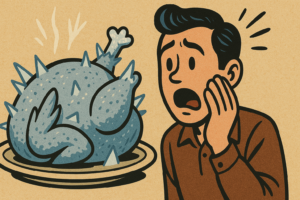Ever found yourself trembling as you suddenly quit a lifelong habit? That’s going cold turkey.
To quit a habit or addiction suddenly and completely, without any gradual reduction.

This powerful idiom describes the challenging process of stopping a behavior abruptly.
While many picture leftover thanksgiving dinner when hearing this phrase, it actually refers to a determined approach to breaking habits with no gentle transition period.
Understanding the Meaning
When someone says they are going to “go cold turkey,” they intend to quit a habit or activity in the most direct way possible. They do not rely on gradual steps or replacements. Instead, they make a clean break.
This idiom often appears when talking about addictive or unhealthy behaviors. For instance, people may use it to describe quitting smoking, drinking, or unhealthy food choices.



The expression conveys not only the action but also the difficult path of withdrawal and sudden lifestyle change.
There is a strong sense of resolve in these words. The “cold” part of the idiom reflects the stark and somewhat shocking nature of this decision.
Instead of taking small steps to reduce a habit, the person goes immediately from engaging in the behavior to stopping entirely.
A Note on Origins
There is some debate about the earliest appearance of “go cold turkey.”
Although many sources have cited the 1800s, most experts believe the phrase became more common in the early 1900s, especially regarding drug withdrawal.



The imagery of “cold turkey” is said to describe how someone’s skin might look when going through abrupt withdrawal: pale, bumpy, and quite uncomfortable.
Regardless of the exact historical origin, the idea remains the same. It focuses on a sudden change that feels as jarring as stepping into a cold shower.
This note clarifies that the phrase is most frequently documented in the early 20th century, rather than the 1800s.
Why “Go Cold Turkey” Is Hard
Cutting off a habit is rarely simple. An individual often experiences strong cravings or withdrawal symptoms, especially if the behavior involves substances like nicotine, caffeine, or sugar.
The mind and body may expect a certain ritual or reward, and that abrupt stop can feel shocking.
People who choose to “go cold turkey” often face psychological hurdles as well. A habit can be deeply tied to daily routines or stress relief. Without a slow, measured reduction, those routines suddenly shift.
This can be exhausting but also incredibly freeing once the initial discomfort passes.
Real-Life Example
- A Frustrating Start
Imagine someone who has smoked for years. Their morning routine might start with coffee and a cigarette, and their break at work might involve stepping outside for another. They try tapering off, but it never sticks. - The Abrupt Decision
At some point, they decide it’s all or nothing. They throw out their remaining cigarettes, remove ashtrays from the house, and announce to friends they will stop entirely. This bold act represents going cold turkey. - First Days of Struggle
The next few days are a battle. A wave of cravings hits whenever they feel stressed or bored, and the sudden absence of cigarettes leaves them uneasy. Yet, they persist, reminding themselves why they chose this approach in the first place. - Eventual Victory
Over time, the cravings lessen, and they discover alternative ways to fill those moments. Perhaps they start walking during breaks or chewing gum in the morning. That successful shift in routine, without gradual reduction, exemplifies the spirit of “go cold turkey.”
Real-Life Example
Not all habits involve substances. For some, the strong attachment lies in activities like video games. Imagine someone who spends multiple hours each night gaming online.
They know it affects their social life and productivity, but cutting back slowly never seems to work.
Then they decide to “go cold turkey” and disconnect the console, sell the games, or block certain apps on their phone. The first weekend might feel strange, like missing an old friend.



They may reach for the controller out of habit, only to recall the sudden commitment they made.
Over time, that empty slot in the day becomes a chance to read more, take up a new exercise routine, or reconnect with hobbies they have neglected. The swift change, while painful at first, can bring significant and lasting benefits.
Funny Anecdotes & Confusions
Some people, when they hear “cold turkey,” truly believe it involves a plate of cold turkey slices. Others assume it’s a special diet focusing on turkey and excluding everything else.
These mix-ups can lead to funny moments in conversation.
For instance, a person may announce, “I’m going cold turkey on caffeine,” and a friend might reply, “Do you really need turkey to quit coffee?” Such confusion quickly dissolves when the intended meaning becomes clear.
Nonetheless, these lighthearted misunderstandings serve as a reminder of just how colorful idioms in English can be.
Example Sentences
Below are some everyday situations where “go cold turkey” fits naturally:
- “After years of late-night snacking, she decided to go cold turkey on sugary desserts.”
– This shows abrupt and complete avoidance of sweet treats. - “He kept telling himself he would smoke less, but eventually he realized he had to go cold turkey.”
– Gradual attempts failed, so he chose an immediate stop. - “She planned to watch less TV but ended up going cold turkey and canceling her streaming subscription.”
– An all-or-nothing move to remove the temptation altogether. - “My friend went cold turkey on social media, deleting every account the same day.”
– A drastic measure taken to eliminate distractions. - “He tried to reduce his gaming time gradually, but eventually he went cold turkey and gave away his console.”
– Shows that smaller reductions did not work, so he chose a complete halt.
Similar Expressions
There are several expressions in English that carry a similar meaning to “go cold turkey,” though each has a slight nuance:
- “Quit cold”
– A direct version of the phrase, meaning no gradual steps. - “Kick the habit”
– Focuses on breaking a specific habit permanently, though not always implying immediacy. - “Go clean”
– Often used to describe giving up harmful substances or behaviors, with a sense of moral or health-driven motivation.
These alternatives share the idea of stopping a behavior, though “go cold turkey” most strongly emphasizes an abrupt transition.
Opposite Expressions
In contrast to stopping something abruptly, English also has phrases for making a more gradual shift:
- “Taper off”
– Gradually reducing the frequency or intensity of a habit until it’s gone. - “Wean off”
– Slowly withdrawing from a substance or activity, often implying small, controlled steps. - “Phase out”
– Eliminating something in stages, such as removing unhealthy foods from a diet one at a time.
These expressions highlight a softer approach, where the habit is diminished over time rather than dropped all at once.
Pop Quiz: Check Your Idiom Skills
Go Cold Turkey

Practical Tips
- Identify Your Triggers
– Recognize times or emotions that drive you to indulge in the habit. Being aware of triggers makes it easier to confront cravings. - Seek Support
– Ask friends or family to encourage your decision. Having an accountability partner can ease the process and lift your motivation. - Replace the Habit
– Fill the new gap in your schedule or routine with something positive. Consider exercise, reading, or learning a skill. - Prepare for Withdrawal
– If you are quitting substances like nicotine or caffeine, be ready for headaches, irritability, or fatigue. Knowing these symptoms in advance helps you handle them better. - Celebrate Milestones
– Each day of success, no matter how small, is progress. Rewarding yourself in healthy ways can strengthen your commitment.
Conclusion
“Go cold turkey” is a vivid idiom for suddenly quitting a habit. It highlights both the difficulty and boldness of making an abrupt change.
From smoking to sugar, going cold turkey can be tough but effective.



This phrase captures how dramatic lifestyle shifts can bring real results.
Understanding it lets you join conversations about quitting, share your own stories, and even add humor when talking about breaking habits.
Sometimes, a clean break is best. With courage and patience, going cold turkey can lead to lasting change.









Comment